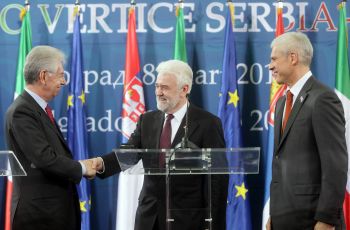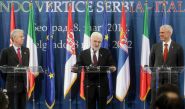Q:
A:
Strategic partnership between Serbia, Italy in all remits
Belgrade,
8 March 2012
Prime Minister Mirko Cvetkovic today thanked Italy for its principled support to Serbia in the EU accession process, stressing that Italy is one of the most important economic partners to Serbia.
At a joint press conference with Serbian President Boris Tadic and Italian Prime Minister Mario Monti, held following the second Serbia–Italy Summit, Cvetkovic said that during today’s bilateral meetings several agreements between the two states were signed, one of which refers to the EU integration process.
He stressed that the acquisition of EU candidate status is an advantage and a possibility to improve cooperation with Italy, but it is also an obligation for Serbia to continue with reforms and EU integration more intensively than before.
The Prime Minister recalled that Italy is Serbia’s third largest foreign trade partner, while in terms of foreign investments it is fifth-ranked.
There are over 400 Italian companies doing business in Serbia and employing over 20,000 workers, Cvetkovic observed, adding that there have been no objections to the work of these companies or their treatment of workers in Serbia.
The Italian partners showed their interest in participating in the construction of railway Corridor 11 through Serbia, from Belgrade to Montenegro, as well as in the construction of the Belgrade underground.
President Tadic voiced his expectation that the strategic partnership with Italy will result in the arrival of a large number of Italian companies in Serbia and the continuation of the Italian government’s support to Serbia’s integration process.
He stressed that the strategic partnership between the two states has already resulted in a more balanced foreign trade exchange, noting that the possibilities for enhancing the economic cooperation are enormous.
During today’s meeting, the two delegations discussed cooperation in a number of projects, primarily in energy and transport, he remarked.
As potentially interesting areas for cooperation, Tadic listed the steel industry, mining, agriculture, the pharmaceutical and textile industries and the footwear industry.
Serbia’s transport systems have blossomed and Italy will benefit from this, bearing in mind that the shortest route from Italy to Turkey and the Near East leads through Serbia, Tadic observed.
He pointed out that representatives of the governments of Serbia and Italy also discussed possible cooperation in building road corridors 10 and 11, as well as plans of modernisation of railway network in Serbia.
The Serbian President listed energy projects in which Serbia is already cooperating with Italian companies or intends to establish cooperation, noting that apart from being a producer of electricity, Serbia will be significant for Italy as an important hub for transport of electricity.
Tadic said that the start of production Fiat 500 L in Kragujevac symbolically rounds up tradition of Serbian-Italian cooperation in the field of car industry.
Today's summit is being held immediately after Serbia received candidate status for EU membership, he recalled and thanked Italy for the support provided to Serbia on its European integration path.
There is just one disagreement between the two countries, that about Kosovo-Metohija, he said.
He, however, stressed that Italy, unlike other countries that have recognised the unilaterally declared independence of the southern Serbian province, is known for its diplomatic flexibility and focus on solving problems.
There are many modalities in which the problems in Kosovo could be resolved; life there must not stop and the system functioning must be provided, but the red lines need to be observed, said Tadic, adding that Serbia remains committed to resolving problems in Kosovo.
Monti said that today's talks went in a spirit of friendship and strategic partnership, and reiterated that Italy strongly supports Serbia on its EU path.
He said that Serbia deserves candidate status for EU membership and praised its commitment demonstrated to meet the EU requirements.
Regarding the date for starting negotiations for Serbia's EU membership, the Italian Prime Minister said that it is a very important stage after which there is no way back.
He pointed out that the two countries have different views on Kosovo, which should be respected, but it is important that there is willingness and commitment to reach solutions.
Belgrade and Rome are united in achieving economic growth, Monti said, noting that the economic exchange between the two countries is very good, and is slowly returning to the 2008 pre-crisis level.
He expressed satisfaction with the investments of Italian companies in Serbia and stressed that the Italian companies are interested to invest in Serbian infrastructure.
He stressed that the acquisition of EU candidate status is an advantage and a possibility to improve cooperation with Italy, but it is also an obligation for Serbia to continue with reforms and EU integration more intensively than before.
The Prime Minister recalled that Italy is Serbia’s third largest foreign trade partner, while in terms of foreign investments it is fifth-ranked.
There are over 400 Italian companies doing business in Serbia and employing over 20,000 workers, Cvetkovic observed, adding that there have been no objections to the work of these companies or their treatment of workers in Serbia.
The Italian partners showed their interest in participating in the construction of railway Corridor 11 through Serbia, from Belgrade to Montenegro, as well as in the construction of the Belgrade underground.
President Tadic voiced his expectation that the strategic partnership with Italy will result in the arrival of a large number of Italian companies in Serbia and the continuation of the Italian government’s support to Serbia’s integration process.
He stressed that the strategic partnership between the two states has already resulted in a more balanced foreign trade exchange, noting that the possibilities for enhancing the economic cooperation are enormous.
During today’s meeting, the two delegations discussed cooperation in a number of projects, primarily in energy and transport, he remarked.
As potentially interesting areas for cooperation, Tadic listed the steel industry, mining, agriculture, the pharmaceutical and textile industries and the footwear industry.
Serbia’s transport systems have blossomed and Italy will benefit from this, bearing in mind that the shortest route from Italy to Turkey and the Near East leads through Serbia, Tadic observed.
He pointed out that representatives of the governments of Serbia and Italy also discussed possible cooperation in building road corridors 10 and 11, as well as plans of modernisation of railway network in Serbia.
The Serbian President listed energy projects in which Serbia is already cooperating with Italian companies or intends to establish cooperation, noting that apart from being a producer of electricity, Serbia will be significant for Italy as an important hub for transport of electricity.
Tadic said that the start of production Fiat 500 L in Kragujevac symbolically rounds up tradition of Serbian-Italian cooperation in the field of car industry.
Today's summit is being held immediately after Serbia received candidate status for EU membership, he recalled and thanked Italy for the support provided to Serbia on its European integration path.
There is just one disagreement between the two countries, that about Kosovo-Metohija, he said.
He, however, stressed that Italy, unlike other countries that have recognised the unilaterally declared independence of the southern Serbian province, is known for its diplomatic flexibility and focus on solving problems.
There are many modalities in which the problems in Kosovo could be resolved; life there must not stop and the system functioning must be provided, but the red lines need to be observed, said Tadic, adding that Serbia remains committed to resolving problems in Kosovo.
Monti said that today's talks went in a spirit of friendship and strategic partnership, and reiterated that Italy strongly supports Serbia on its EU path.
He said that Serbia deserves candidate status for EU membership and praised its commitment demonstrated to meet the EU requirements.
Regarding the date for starting negotiations for Serbia's EU membership, the Italian Prime Minister said that it is a very important stage after which there is no way back.
He pointed out that the two countries have different views on Kosovo, which should be respected, but it is important that there is willingness and commitment to reach solutions.
Belgrade and Rome are united in achieving economic growth, Monti said, noting that the economic exchange between the two countries is very good, and is slowly returning to the 2008 pre-crisis level.
He expressed satisfaction with the investments of Italian companies in Serbia and stressed that the Italian companies are interested to invest in Serbian infrastructure.












